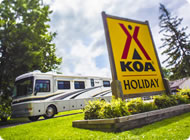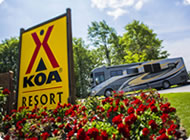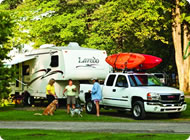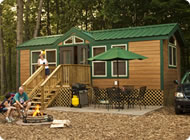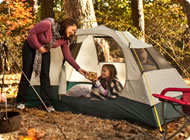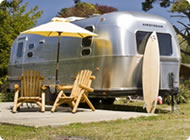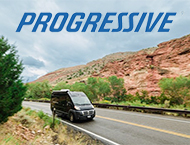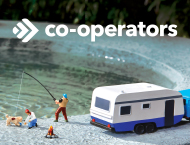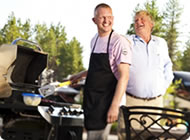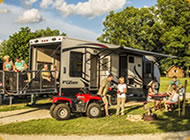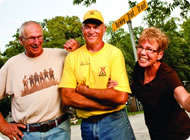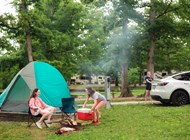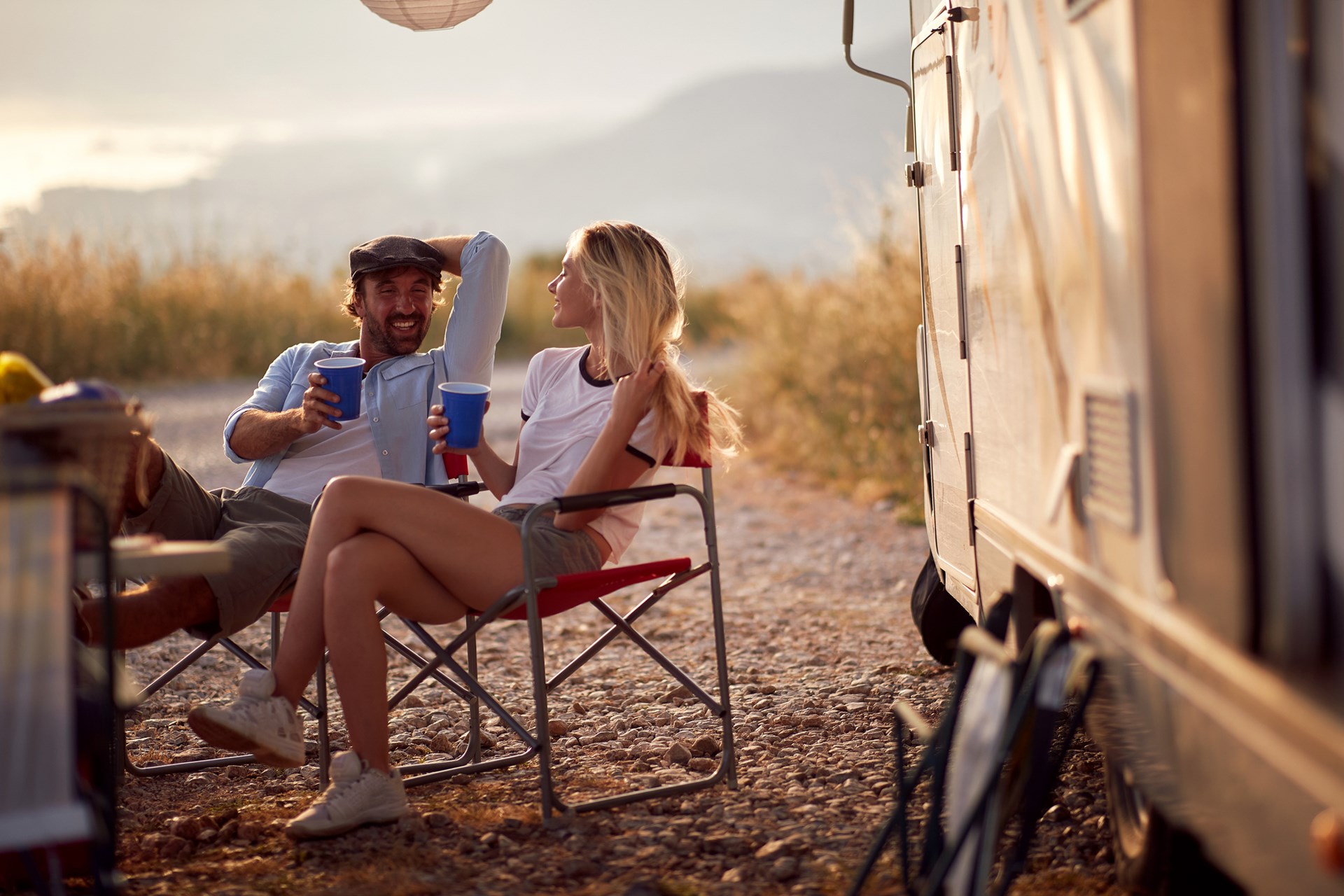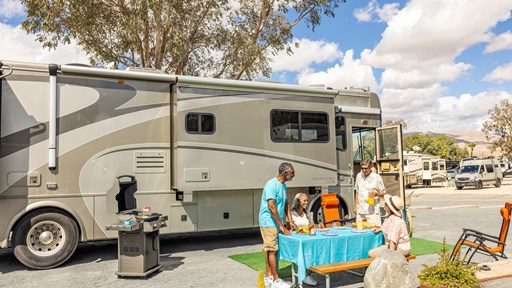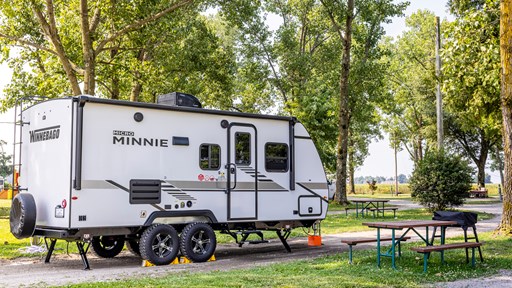Especially magnified over the past couple years, with the epic renaissance of the all-American road trip, living and traveling in an RV full-time is something a lot of folks dream of — but as dreamy and exciting as RVing can be, it’s certainly no walk in the park. Not without its challenges, living in an RV requires patience, dexterity, problem-solving, and an ability to improvise, not to mention the willingness to make certain sacrifices. If you’ve fantasized about making the leap to full-time RV living or just want to take a trip or two, here are some tips to keep in mind, to ensure the experience is the dream you’ve always imagined it would be.
Must-Know Tips for New RVers
1. Live Minimally
The most obvious and major change that comes with moving into an RV, especially if you’re coming from a house, is the downsizing that comes with it. Even if you snag a bus-sized RV, there’s no denying that physical space and constraints will be inhibitive, with far less storage and luxury than a home, condo, or apartment. The more comfortable you are at living a minimalist lifestyle, the easier the transition will be, but it can still be a shock to the system having to sell or toss so many personal possessions. Of course, putting things in storage is always an option, but renting a storage unit costs money you may not want to spend. So before making the leap, sift through everything you own — your clothes, your souvenirs, your kitchen gadgets, your entertainment items, etc. — and hone in on the absolute necessities only. Organize things into categories like “to keep,” “to sell,” or “to toss,” and this will help the overall transition phase feel less daunting.
2. Use Road Trip Apps
Living out on the open road necessitates a pretty firm grasp on general navigation. After all, there’s no faster way to taint an RV experience than by constantly getting frustratingly lost, especially in remote areas with little to no cell service to help you re-route. That’s why preemptively downloading road trip apps – especially those that help with navigation – comes in handy. Most apps, like Roadtrippers and Gasbuddy, are free and easy to use — the former tells you fuel cost and distance, while the gas app helps you map out area gas stations by price. Google Maps and Waze are convenient navigation apps that’ll literally map out your best route, while Roadside America is more of a fun one that points out kitschy roadside quirks.
3. Keep Change On Hand
While big-city living rarely necessitates having cash, RV life is a different story. The main reasons: toll booths and laundromats. Shifting to RV living means you’ll be visiting laundromats more regularly, most of which still only accept change, so it’s always good to have a stockpile of coins. The same is true for tolls. Unless you’re gonna be in the same state for a long period of time (in which case investing in the state’s designated highway toll pass might be a worthwhile purchase), you’ll want to have more than enough cash in your pocket for those unexpected toll plazas. This is especially true if driving near a city like New York, or anywhere in the state of Florida.
4. Learn About Boondocking
For multiple reasons, it’s simply not possible to stay in a luxe RV park or campground every single night of your RV life. Not only would that be expensive, but if you’re journeying around at all, there will inevitably be lots of areas where such abodes don’t exist. That’s where boondocking enters the equation. It’s the term for parking your RV somewhere with no hookups or amenities, like at a gas station, rest stop, or certain Walmart parking lots that allow overnight parking. Sure, it’s not like you’re roughing it in the wilderness, but without connections to water or electricity, it’s a fairly primitive experience by RV standards. Beyond lights turning on, this means you’ll need to have some kind of outlet to plug into the front of the vehicle if you want to use anything else. You also probably won’t be able to use any pullouts, so make sure that other sleeping areas (like couches) are comfy and well stocked with pillows and blankets. Also, in regards to where boondocking is or isn’t allowed, it’s always best to ask when in doubt. This is particularly true of store parking lots, like Walmart, as not all of them allow it.
5. Always Have Antifreeze
An essential product for any vehicle, antifreeze is especially crucial for RV life. This is most notable if traveling through a cold environment, as RVs are much more vulnerable to cold-weather damage than houses. If the temperature dips below freezing, for instance, this could really mess up the piping for your toilet, shower, and sink. In order to prevent said pipes from freezing and turning into a frigid headache, preempt the effects by pouring antifreeze down the drains before things get too frosty. You’ll thank yourself later.
6. Pack a Space Heater (and Bundle Up)
In other cold-weather advise, a space heater is a great way to keep yourself cozy in those chillier-than-expected environments. Even though most RVs are equipped with heaters, there’s only so much they can do, especially if the forecast feels like a tundra — and especially if you’re boondocking with no hookups, more exposed to the elements. In those cases, it helps to have a backup heat source to help keep your living space warm. Other things to have on hand for potential cold weather include lots of blankets, coats, gloves, thick socks, heated blankets, and warm hats.
7. Get Used to Gas Station Showers
Just like adapting to laundromats and minimalism, one major adjustment to get used to is the shower situation. Many RV showers are quite small and claustrophobic, with water pressure that leaves a lot to be desired. It’s the kind of lackluster shower situation that’ll lower your standards, and provide a newfound appreciation for gas station showers. If you’d rather use your RV shower only as an occasional backup, gas station showers can be a saving grace with their much larger spaces, solid water pressure, and amenities. Shower facilities are typically found in larger gas stations and truck stops, and they’re usually perfectly clean and well-stocked. They cost a small fee, but it’s worth it for the comforts of a hot shower in a spacious room all to yourself.
Similarly, also consider shower options when booking your campground stays. Some campgrounds will offer no showers while other options, like KOA campgrounds, will provide comfortable shower facilities.
8. Stock Up On Healthy Snacks
As ubiquitous as fast-food restaurants and roadside eateries are when living in an RV, it’s probably not a good idea to eat every meal from a chain restaurant or gas station — it’ll add up quick, both in terms of expenses and calories. While a fine treat on occasion, try to stick to the habit of primarily eating healthy, which means stocking your fridge and cupboards with more wholesome snacks and meals that’ll keep you fueled, energized, and feeling good. Hummus, carrots, apples, nuts, cheeses, granola, and whole grains are good ideas, along with non-soda drinks. Especially when you consider how sedentary the RV lifestyle can be on long drives, you’ll want to eat things that won’t make you feel groggy, and provide you enough stamina for long hauls.
4. Use Social Media
The #RVLife community has boomed in popularity in recent years, and it’s become a particular sensation on social media. Nowadays, there are many RVers who share their journeys — the good, the bad, and the ugly — on Instagram, Facebook, Twitter, YouTube, and TikTok. Not only are these great first-person resources for folks to follow, but social media is a great way to make digital friends and potentially even meet new people in real life.
 Born and raised in New Hampshire, Matt Kirouac grew up with a love for camping and the outdoors. Though he’s lived in Chicago since 2006, he’s always on the lookout for new adventures. He writes about travel and food for outlets like TripExpert, Money Inc, Upventur, DiningOut, Food Fanatics magazine, Plate Magazine and Zagat, and he currently serves as Chicago editor for What Should We Do?! He’s the author of The Hunt Guides: Chicago (2016) and Unique Eats & Eateries of Chicago (2017).
Born and raised in New Hampshire, Matt Kirouac grew up with a love for camping and the outdoors. Though he’s lived in Chicago since 2006, he’s always on the lookout for new adventures. He writes about travel and food for outlets like TripExpert, Money Inc, Upventur, DiningOut, Food Fanatics magazine, Plate Magazine and Zagat, and he currently serves as Chicago editor for What Should We Do?! He’s the author of The Hunt Guides: Chicago (2016) and Unique Eats & Eateries of Chicago (2017).






